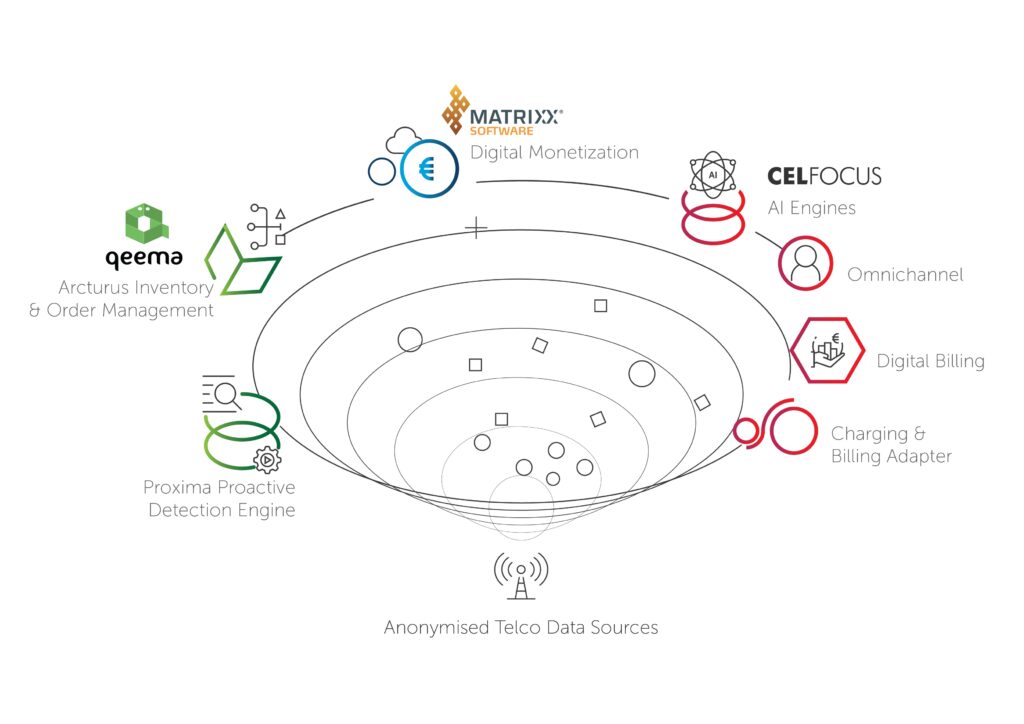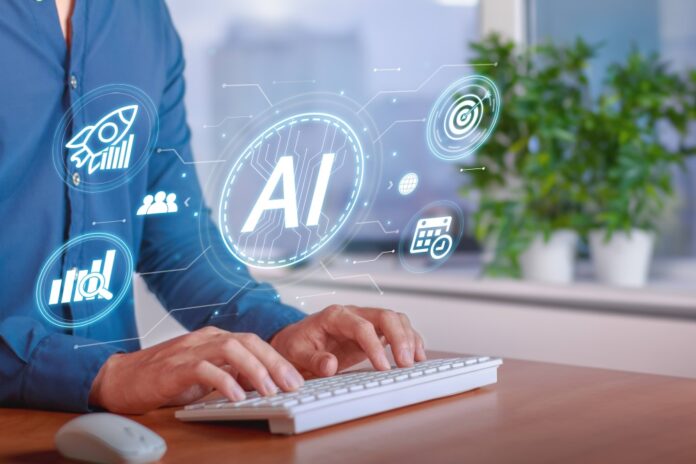Partner content: Award winner of Outstanding Catalyst for Application of AI and Automation at TM Forum’s DTW24
Why it matters?
While personalisation is not an entirely new topic, it is now experiencing a significant surge in attention. This hype is driven by Communication Service Providers (CSPs) realising the need to engage customers more effectively and cost-efficiently, coupled with a growing customer demand for individualised experiences.
Additionally, CSPs have a unique opportunity to harness the potential of emerging technologies – such as Artificial Intelligence (AI), Machine Learning (ML), and Generative AI (GenAI) – which have witnessed remarkable advancements in recent months. While the adoption of these technologies is not mandatory, analysts suggest that organisations that hesitate to embrace them, risk being outpaced by their competitors.
Numerous studies highlight the transformative benefits these emerging technologies can offer, and they consistently affirm the competitive edge gained through their implementation.
Market challenges
CSPs are under increasing pressure to deliver the next best experience to their customers. However, the offerings – products, services and pricing – across different providers have become less distinctive and increasingly homogenised. When competition is fierce and options are equivalent, the key differentiator becomes the customer experience. The lack of differentiation not only presents challenges for CSPs in retaining customers but also expands customers’ selection options. The heightened competition exacerbates the urgency for CSPs to enhance customer satisfaction and trust, which are vital for securing long-term loyalty.
Moreover, CSPs are being pushed to continuously increase revenue while facing several challenges in a saturated market. There is a strong demand for high revenues and stable margins, which places considerable pressure on CSPs to optimise marketing investments and reach customers more effectively. Unfortunately, traditional mass marketing strategies often yield disappointing returns, necessitating a shift towards more targeted and efficient engagement strategies.
Another significant challenge is the ongoing pressure to reduce operational costs. Chief Operating Officers (COOs) and their teams face the imperative to innovate each year, seeking avenues for further improvements. These efficiencies can be achieved either through direct cost reductions or by optimising existing operations. A crucial part of this strategy involves promoting proactive care experiences that empower customers to utilise unassisted channels. By automating customers interactions and streamlining processes, CSPs can manage operational costs more effectively while still enhancing the customer experience.
Solution
To address these different challenges, a Catalyst consortium was formed, bridging the ambitions of both CSPs and technology vendors. The Catalyst champions included notable CSPs like Bell Canada, Jawwy from Saudi Telecom Company Group, and Vodafone represented by teams from both Vodafone Group and Vodafone UK. Participating in the consortium were system integrators and product vendors such as Celfocus, MATRIXX, and Qeema.
The primary objective of this Catalyst consortium was to deliver value through advanced analytics and cognitive solutions, tapping into the vast reservoir of data available to CSPs with three main ambitions:
- Enhanced Customer Engagement – to foster truly hyper-personalised experiences tailored to individual customers.
- Data Monetisation – to leverage existing data to create new revenue streams and promote revenue growth.
- Operational Efficiency Improvement – to focus on enhancing customer support activities, reducing operational costs, and increasing overall productivity.
Data is critical to achieving these ambitions. Fortunately, CSPs hold a significant advantage over many other industries – they not only have access to a vast customer base but also collect a substantial amount of data on each customer interaction. Therefore, the challenge lies not in the deficit of data but in extracting relevant and actionable insights from it.
The Catalyst initiative has unlocked several innovative use cases, organised into three key modules, leveraging AI, ML and Gen AI models:
- Real-Time Usage Prediction and Bill Forecasting – this use case aims to enhance customer satisfaction by proactively addressing and efficiently resolving customer expectations.
- Personalised Plan Recommendations – by utilizing AI-enabled recommendation engines in real-time, this module aims to drive revenue growth through tailored recommendations of products and services.
- Augmented Customer Support – leveraging Gen AI, this use case focuses on boosting agent productivity and efficiency while empowering customers to autonomously resolve their issues.
To enable these use cases, a suite of foundational platforms was integrated into the overall solution:
- Digital Monetisation Platform – serves as the source for real-time usage and monetisation data.
- Customer Data Platform – acts as the backbone, ingesting customer profiles through an event broker.
- Data Insights Platform – houses the AI, ML and Gen AI models that generate relevant and actionable insights.
- Digital Experience Platforms – these platforms facilitate the activation and delivery of enhanced customer experiences across digital channels, particularly selfcare and call centre interfaces.
- Core Systems – from the foundation of the end-to-end solution, encompassing crucial components such as the Digital Billing Platform, Order Management System, and Product Catalogue.

The Catalyst project achieved remarkable accuracy levels across various models, evidenced by:
- Prediction and Forecasting Models – error levels ranged between 3% and 6%.
- Augmented Customer Support Metrics – accuracy rates reached between 85% and 93%.
To attain these high accuracy levels, access to real, anonymised data from the champions was essential for training and fine-tuning the models.
Differentiators
This Catalyst distinguished itself through four main differentiators that contributed significantly to the successful outcomes:
- Data-Enabled Approach – the methodology employed facilitated a paradigm shift in data consumption by enabling a push model, allowing data to be shared proactively with relevant stakeholders instead of relying on a pull model.
- Real-Time Capabilities – in today’s fast-paced environment, immediacy is crucial. The approach transitioned from a reactive framework to a proactive model underpinned by event-driven architecture, ensuring that valid insights remain relevant.
- AI-Driven Insights – by leveraging AI, ML, and GenAI models, the Catalyst moved from rule-based strategies to those generating unique, context-sensitive insights, thus enhancing decision-making capabilities.
- Hyper-Personalisation – the initiative emphasized a move from a generalised, segmented approach to one that focuses on individual needs, fostering one-to-one personalised experiences.
Benefits
This project demonstrated how automation, AI, and a robust platform of rich telecommunications data could be seamlessly integrated into business processes to enhance customer experiences and improve satisfaction scores by up to 10%[1]. Additionally, the project enabled faster revenue growth, with estimations suggesting increases of up to 15%[2] and market share expansion through accelerated innovation by 90%. Operational costs related to call centre operations were also reduced, notably by achieving call deflection rates of up to 50%[3] and decreasing call handling times by up to 40%[4].
Furthermore, the project aimed to quantify the tangible impacts of these digital solutions on business outcomes. Through testing AI-driven forecasting, recommendations, and support models with anonymised customer data, the project validated the solution’s accuracy and efficiency. The project team estimated potential annual gains for CSPs, presenting a range from pessimistic to optimistic scenarios influenced by various factors (geography, digitalisation maturity, call duration, labour costs, call volume, etc): €4.3M to €17.2M in Europe, €5.1M to €41.2M in North America, and €1.4M to €4.3M in the Middle East.
It is important to notice that in certain scenarios, CSPs may not yield a positive business case. This led to a crucial conclusion: always begin with a thorough analysis of the business case to inform the implementation roadmap and guide subsequent growth.
Industry recognition
This project received accolades from TM Forum at its DTW24 edition, securing one of the most coveted awards among 50 catalysts, 72 service providers, and 125 vendors, specifically for Outstanding Catalyst for Application of AI and Automation. This recognition highlights the innovative and sustainable use cases developed through this initiative.
For more information on Realtime Intelligent Customer Experience Catalyst and its implementation, please visit the TM Forum Catalyst Projects.
About the author
Luís Coelho is the Head of Hyper-Personalisation Offer at Celfocus. He brings over 20 years of comprehensive experience in delivering IT projects and pre-sales activities for the telecommunications and financial services sectors. Luís focuses on developing business and technical solutions that harness data to enable successful digital transformations. He bridges data, cognitive and digital capabilities to provide unique and highly relevant customer experiences, allowing service providers to connect with customers more effectively.
With a passion for the field, Luís’ unique value lies in his ability to combine business acumen with technology insights through a human-centric approach. He holds a master’s degree in Computer Science Engineering from Lisbon Technical University, along with several certifications in Agile, Project Management and relevant technical areas.

[1] https://www.mckinsey.com/industries/technology-media-and-telecommunications/our-insights/unlocking-the-value-of-personalization-at-scale-for-operators
[2] https://www.mckinsey.com/capabilities/mckinsey-digital/our-insights/marketings-holy-grail-digital-personalization-at-scale
[3] https://www.mckinsey.com/capabilities/mckinsey-digital/our-insights/the-economic-potential-of-generative-ai-the-next-productivity-frontier
[4] https://www.mckinsey.com/capabilities/operations/our-insights/how-advanced-analytics-can-help-contact-centers-put-the-customer-first



